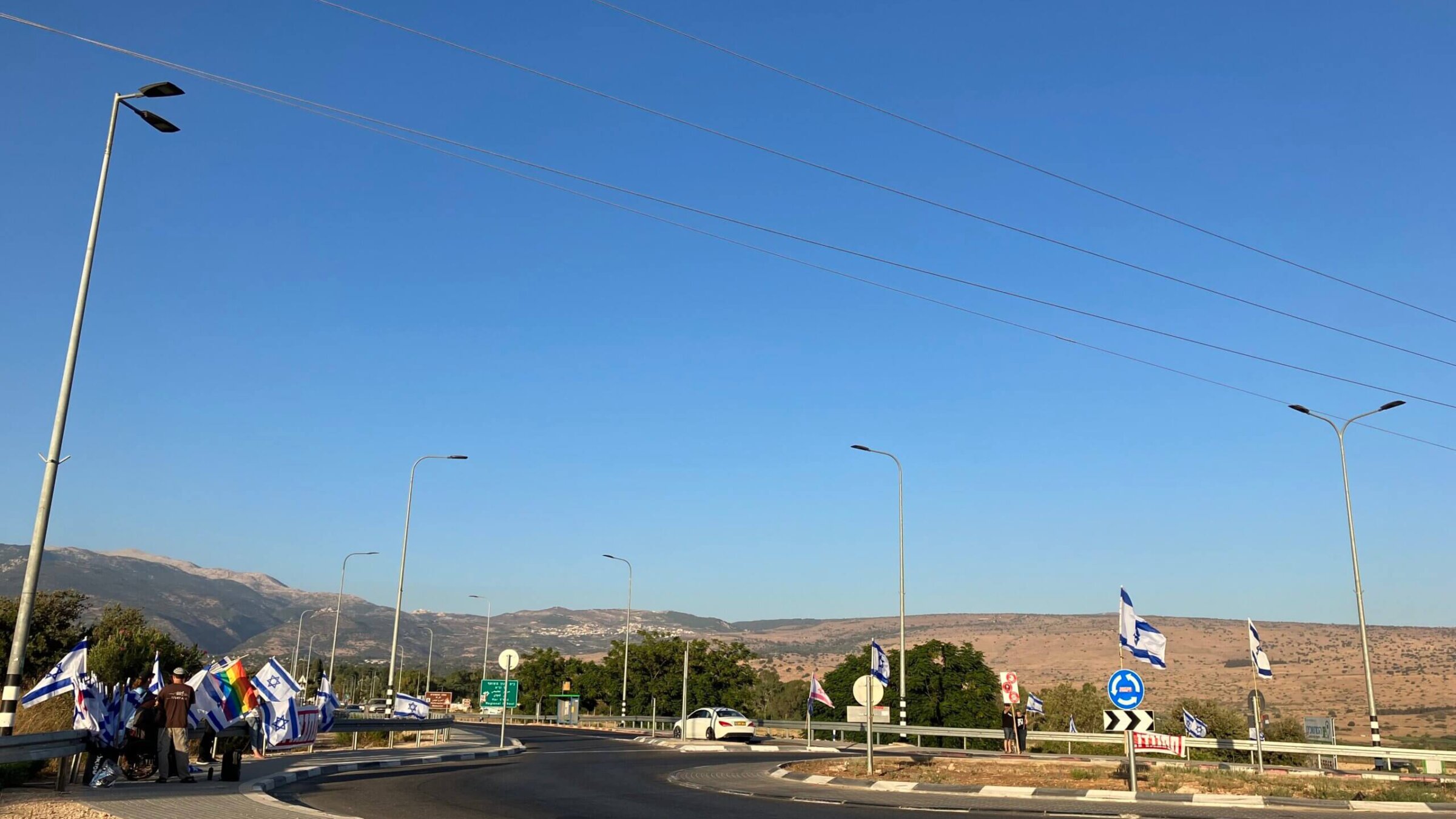Small-town Israelis strive to make themselves heard, protesting anywhere anyone will see them
In Israel’s remote north, dozens of protesters gathered around a highway junction

The small protest around Horshat Tal junction in northern Israel’s Golan Heights. Photo by Mira Fox
HORSHAT TAL, ISRAEL — A remote traffic circle in the Golan Heights on Monday evening was covered in Israeli flags.
Benjamin Netanyahu, Israel’s prime minister, was vacationing at a village farther up the road with his wife, Sarah, and the mood was tense.
A protest group had gathered around the junction. They’d added a small Israeli flag to the top of each street sign, and about 10 people stood around the circle, holding large Israeli flags — one woman had a rainbow one — and protest signs. The group waved them at the cars that passed through, and some drivers honked in response.
After the Knesset, Israel’s parliament, passed a controversial law two weeks ago that aims to limit the power of the country’s Supreme Court, images of Tel Aviv’s protests went viral. Hundreds of thousands of people surged into the streets across Israel, blocking highways and major intersections, and police responded with violence.
But while Tel Aviv’s protests have attracted the most international attention, they are far from the only ones. Across the country, there are protests every Saturday, far from the public eye, gathering around remote highway intersections. Residents of the surrounding villages meet and stand, maybe a few dozen strong, with their flags and signs seen only by whoever happens to be driving the curving road through the mountains.
When I pulled over at the junction in Horshat Tal, which lies in the mountains of Israel’s northern district, the Golan Heights, Yael Shmueli, who organized the junction’s demonstration, immediately offered me a large flag from a bucket full of them.
The Horshat Tal junction protest is relatively new — they’ve only been gathering for a month. Shmueli said about 40 or 50 people show up from nearby kibbutzim and moshavim, and they’re usually met with supportive honks from passing cars.

The Monday night protest was organized at the last minute; the group has previously gathered only on Saturdays. But with Netanyahu nearby, Shmueli wanted to act. While I stood with them, they got plenty of encouraging honks and fist pumps from passing drivers. But several cars also went by, occupied by Haredi families, who shouted “only Bibi” and “bushah, bushah” — “shame” — out of the window, turning a frequent protest chant back on the protesters.
Earlier, Shmueli said, a car with four men had pulled over, blocking the road, and gotten out to harass the woman with the rainbow flag, yelling and physically intimidating her. “I was so scared, I was shaking,” Shmueli said. She’d called the police, and they’d told her that she could press charges.
But there had been good moments, too, Shmueli said — a religious woman had come by earlier to bring them cookies. While I was there, a young man with a crocheted kippah, a symbol of national religious affiliation — a largely conservative, non-Haredi religious group loosely affiliated with the settlement movement — was engaged in an animated discussion about the protests with Shmueli’s father, who listened patiently from a wheelchair. “They’re arguing, but it’s good,” she told me. “They’ve been at it for almost an hour.”
When the protests began, Shmueli had worked in a school, but they’d told her that she wasn’t allowed to post pictures from the protest or political slogans online. “It felt wrong,” she said; it felt vital to her to protest.
So she quit — now she’s working as a therapist in a psychiatric hospital in Tzfat — and began organizing the junction’s protests. Small protests like the one in Horshat Tal, she said, are important for families with children, as well as anyone scared of the noise and crowds of Tel Aviv’s demonstrations.
I asked whether she thinks these small protests are important — does anyone even notice them there, at a remote junction that’s nearly in Lebanon?
“Well, we’re the farthest north demonstration,” she said. “So I think that’s special.”

















